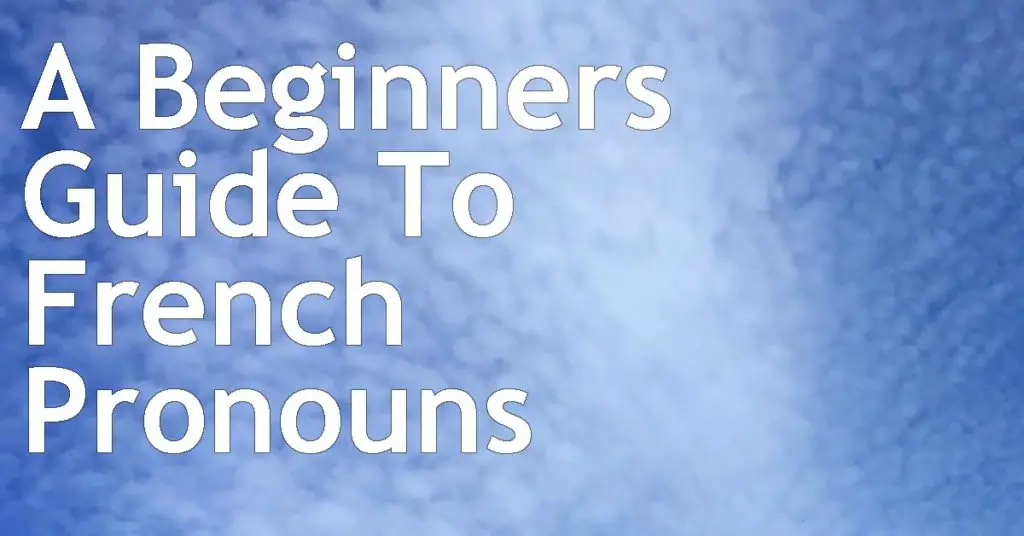Verbs are a huge topic and they cannot be covered in one article, so today we will quickly go over what they are and what they do, so that as a beginner you can get a general understanding of what is going on and what to expect.
Page Contents
What Is A Verb?
French verbs work in the exact same way English verbs do. They are words used to describe an action.
Walking, running, talking and eating – these are all words that describe some sort of action.
These are all examples of verbs. There is an endless amount of them.
You will quickly see that verbs make up a huge part of a language, especially when you realise that you pretty much need them to describe anything you are talking about, so they are a very important part of both the French and English language.
What Is An Infinitive Verb In French?
You will often see the term infinitive being used. This is kind of like a verbs default, most basic form that you would find in the dictionary.
You usually see this with the word “to” in front of it in English.
For example “to run” or “to walk”.
Its then up to you to take this basic version of the verb and assign a subject (a person or an object) in front of it, so you can work out who is doing the action that the verb is describing.
Placing the subject in front of the verb is what we do in English, and also what happens in French.
For example “you run” …“he walks”…”I eat”
When you find a new verb, you should look it up and find the infinitive version and learn this. You will need this version to work out how you should conjugate the verb.
What Is Conjugation In Language Learning?
Conjugation is a word that strikes fears into language learners. It shouldn’t really, but I guess it can get a little confusing at times.
However, the core principals are pretty straight forward; there is just a lot to remember.
We conjugate all the time in English, probably not as much as French, but we still do it.
The core principles are just a set of rules that tell you what to do with verbs in certain situations and with certain subjects.
Like the example from above “To Walk” becomes:
- I walk
- You walk
- He/She walks
- We walk
- You walk
- They walk
So they all look similar, apart from a little –S added to the He/She subjects.
Mostly they have all stayed the same. This is why we often think we do not conjugate in English. However, knowing to add that -S and to keep the rest the same, is conjugation.
It seems so basic and so natural to us that we are not aware that this is a grammar rule called conjugation.
In French, they like to do it differently. It is a little bit more noticeable; nearly every subject is likely to have a different ending. (hopefully you’ve already read my article about French Pronouns)
Marcher (to walk) becomes –
- Je marche
- Tu marches
- Il/Elle marche
- Nous marchons
- Vous marchez
- Ils/Elles marchent
Why Does French Become So Confusing For Learners?
The main issue is that there just seems to be so many rules. Too many to remember, but with time and practice you will be able to master them.
In French, the verbs all end with one of these three endings
- -ER (marcher, parler, danser)
- -IR (finir, choisir, punir)
- -RE (attendre, fondre, vendre)
There are different rules for how you conjugate each of these three different types of verbs.
This is why you need to learn the infinitive version of the verb. Once you know its basic form, you will know its ending, which means you will easily know what rules to follow.
The rules will often ask you remove the last two letters, so that you are left with the root, or the stem. The rules then tell you what letter needs to be added to the stem to make sure it is correct for the pronoun you are using.
Once you do one of these, you can do any verb that ends in the same way. After a while you will get really good at conjugating them as the patterns are all the same.
There is one problem though; some verbs just don’t like to follow the rules.
Irregular Verbs In French
These are what usually upset people. It can be easy enough to learn the three main groups, but the there are some verbs that just don’t follow the rules.
These are the irregular verbs and they really just do whatever they want. There is no way around these. You just have to learn them as they are.
This is why it can feel like there are so many different rules and why it can get so confusing.
(You can read more about – The 12 Most Common Irregular French Verbs)
Tenses In French
To add an extra layer of confusion and even more things to memorise, we need to remember that verbs can also be talked about in different tenses.
In English, “To Walk” can become – “I walk, I walked, I will walk, I was walking”.
Adding –ed or –ing is a very common way to conjugate a verb in English.
But we also have irregular words too. “I drink”, does not become “I drinked”. It has its own rule and becomes “I drank”.
This means that in French, those rules for the 3 verb endings, along with a few extra irregular words, are just for the Present Tense.
As soon as you want to learn any of the Future or Past tenses, you will need to learn a whole new set of rules all over again.
When you suddenly realise there is 6 different subjects and over 6 different tenses, you can start to panic as it feels like you need to learn how to spell one word 36 different ways in order to be able to use it.
This is why conjugation intimates and overwhelms people, but with time you will realise you can do it.
Conclusion
You will quickly realise that nearly every sentence you use in French has some sort of verb in it and you will end up conjugating all day long.
You will also very quickly notice that some verbs are used a lot more than others. You will get very good at being able to use the right ending for the right subject.
As language learning is a long and slow process you are not going to have to try and learn all the tenses in one day.
Take your time. Master one, and then move on to the next. This way you will not be overwhelmed with the amount of conjugation. You will just slowly layer it on and you will be fine.
Just remember that you are able to do this in all the English tenses, so there is no reason why you cannot achieve it in French.
(Read the next lesson –The French Present Tense)

Ian is the owner and main writer of Reaching Fluency. He is a native English speaker, French speaker and Japanese learner and general lover of language learning.
You can read more about him on his Authors Page or link with him on social media
日常英会話メール
ニュースレターを購読してください! - 参加無料
メールリストに参加すると、少なくとも週に 1 回 (場合によってはそれ以上) メールが届きます
メールは毎日の英会話で、読んで勉強することができます。
メールは短いですが役に立ちます。いつでも停止できます



Pingback: Three Very Common And Important French Verbs – Être, Avoir and Aller – Reaching Fluency